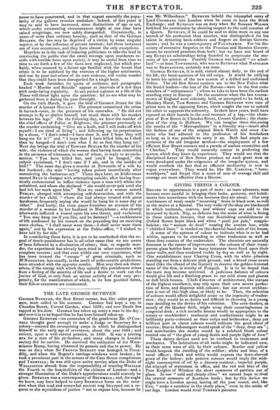THE LATE GEORGE RUTHVEN.
'GEORGE Ruxnvert, the Bow Street runner, has, like other greater men, been called to his account. GEORGE had kept a tap in Chandos Street, Covent Garden, since 1839; and now Death has tapped at his door. GEORGE has taken up many a man in his day ; and now it is to be hoped that he has been himself taken up. GEORGE RUTHVEN—no connexion of the gentleman Mr. O'CoN- NELL thought good enough to make a Judge or Secretary for a colony—entered the enterprising corps in which he distinguished himself at the early age of seventeen, about the year 1804; and retired, upon a well. earned pension, in 1839. It was a stirring mra for a man of his profession; and many changes in London society did he survive. He survived the extinction of the West- minster Rump, having witnessed its genesis and rise to power. He was on duty when Sir FRANCIS BURDETT was besieged in Picca- dilly, and when the Regent's carriage-windows were broken ; he took a prominent part in the arrests of the Cato Street conspirators and TnuaTer.r.; he was still upon active service when the Duke of WELLINGTON shrank from the responsibility of trusting WILLIAM the Fourth to the hospitalities of the citizens of London—and a stronger illustration of the Duke's apprehensions could scarcely be given. RUTHVEN was a contemporary of BROMMELL ; and, for aught we know, may have helped to carry SHERIDAN home on the occa- aion when that mad and somewhat ancient wag hiccuped out a re- quest to the myrmidons of justice "not to expose him, because he was Mr. Wilberforce." RUTHVEN beheld the triumphal entry of Lord COCHRANE into London when he came to hoax the Stock Exchange ; and RUTHVEN was on duty when Sir ROBERT WILSON' forfeited his commission by showing respect to the cold remains of a Queen. RUTEIVEN, if he could be said to shine more in any one branch of his profession than another, was distinguished for his talent in detecting bank-robbers and forgers on foreign Govern- ments; and he was a contemporary of FAENTLEROY. For his dis- covery of extensive forgeries on the Prussian and Russian Govern- ments he received pensions from both : but we have not heard of any RUTHVEN scholarships being founded to perpetuate the me- mory of his exertions. Possibly GEORGE was himself" no schol- lard "—at least TOWNSHEND, who was to RUTHVEN what NAPOLEON was to BERNADOTTE, certainly Was none.
GEORGE RUTHVEN, it is said, visited almost daily, to the end of his life, the head-quarters of his old corps. It would be edifying to learn his opinion of the new system of a drilled and uniformed Police. The old Bow Street runners are to the New Police what the feudal leaders—the last of the Barons—were to the first com- manders of" ordonnances " ; whom we take to have been the earliest standing army in Europe. On the occasions when the last tourna- ments of England were solemnly held, or attempted to be held, at Moulsey Hurst, Ton Si-RING and GEORGE RUTHVEN were men of prime note in the opposing forces, which sought the one to uphold the other to suppress the solemnity. In their later years, both have reposed on their laurels in the cool recesses of a tap,—the cham- pion of Bow Street in Chandos Street, Covent Garden ; the cham- pion of the ring in Holborn. We can imagine them discussing the merits of the "Metropolitans" in a friendly way—much after the fashion of one of the original Black Watch and some Ca- teran who had adhered to the profession of his forefathers as long as it was possible to carry it on. Both had ample ex- perience of the old irregular method—the employment of a few efficient Bow Street runners and a parade of useless constables and " Charlies." They would naturally concur in preferring the system which they knew by experience. They would see that the disciplined forces of Bow Street produce no such great men as were developed under the exigencies of the irregular system, and would overlook the fact that an efficient mediocrity is now in vogue everywhere. They would be, like Mr. CARLYLE, " hero. worshipers," and forget that a score of men of average skill and courage are more effective than a Hector.


























 Previous page
Previous page